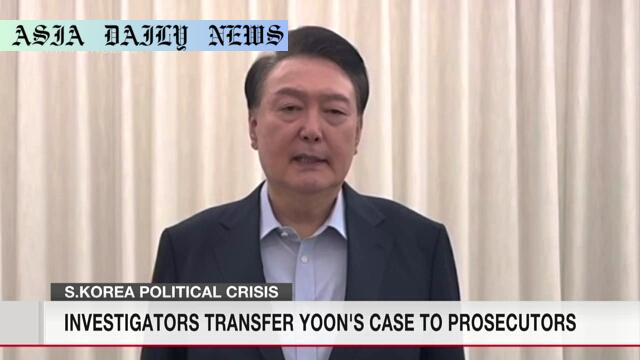South Korea’s anti-corruption agency hands over President Yoon Suk-yeol’s case to prosecutors amid insurrection charges.
- South Korea’s anti-corruption office handed over Yoon’s case to prosecutors.
- The former president faces insurrection-related charges over martial law.
- Yoon has been uncooperative with questioning since his arrest.
- Prosecutors will decide on indictment by early February.

Background on Yoon Suk-yeol’s Case
South Korea’s political landscape has been shaken following the transfer of an investigation involving impeached President Yoon Suk-yeol to prosecutors. Yoon, who faces charges of colluding with military commanders and former Defense Minister Kim Yong-hyun to declare martial law for insurrection purposes, has become the focal point of a major anti-corruption probe. The Corruption Investigation Office for High-ranking Officials (CIO) had initially spearheaded the inquiry but recently announced its decision to hand over the case to prosecutors, citing Yoon’s lack of cooperation.
Charges Against Yoon
The controversy stems from Yoon’s declaration of martial law on December 3, reportedly aimed at starting a riot for insurrection purposes. The ex-president is accused of instigating unrest by colluding with key military figures to gain control through undemocratic means. These allegations have prompted both the CIO and the police to take swift action, culminating in his arrest last Sunday. This marked a significant step in the investigation, though Yoon has continued to resist questioning.
Role of the CIO and Transition to Prosecutors
Initially, the CIO took charge of the investigation, working in tandem with law enforcement to uncover the details of the alleged plot. However, the former president’s refusal to cooperate prompted the CIO to re-evaluate its approach. The agency concluded that transferring the case to prosecutors, who hold the authority to indict, would be a more efficient strategy for advancing the inquiry. Prosecutors are expected to make a final decision on Yoon’s indictment by early February, which could mark a turning point in South Korea’s accountability for high-ranking officials.
Potential Significance of the Case
This case has far-reaching implications for South Korea’s political system and its commitment to upholding democratic principles. Yoon’s actions, if proven, represent a serious breach of public trust and could undermine the nation’s democratic norms. By transferring the investigation to prosecutors, the CIO has underscored the importance of timely and effective legal processes in addressing corruption at the highest levels of government.
The Road Ahead
As this high-profile case unfolds, the focus will shift to the prosecutors’ handling of evidence and their eventual decision on indicting Yoon. The stakes are high, as the outcome of this case could set a precedent for how South Korea deals with similar allegations in the future. Observers both within the country and internationally will be closely watching to see whether justice is served and accountability is maintained in this critical investigation.



Commentary
Examining the Impact of Yoon’s Controversial Reign
The recent transfer of Yoon Suk-yeol’s case to prosecutors sheds light on the complexities of tackling political corruption in South Korea. Allegations of declaring martial law for insurrection pose serious questions about the integrity of those in power. While the charges are still being investigated, the seriousness of the accusations underlines the fragile balance that exists between upholding democracy and the misuse of authority for personal gain.
The Importance of Transparent Judicial Processes
The CIO’s decision to transfer the case highlights the necessity of a transparent and efficient judicial system in handling high-stakes allegations. The ability of prosecutors to take decisive legal action will play a pivotal role in restoring public faith in South Korea’s institutions. The looming decision regarding Yoon’s indictment will not only affect his political career but could also send a strong message regarding accountability for high-ranking officials in the country.
A Critical Test for South Korean Democracy
This case also stands as a critical test for South Korea’s commitment to democratic principles. If the allegations against Yoon are substantiated, it could point to deeper systemic vulnerabilities within governmental institutions. Conversely, a fair and comprehensive investigation that leads to appropriate actions could reinforce the nation’s standing as a beacon of democracy in Asia.
Ultimately, this moment serves as a reminder that no individual is above the law. As the legal proceedings continue, it will be crucial for both the public and institutions to demand fairness, transparency, and justice.